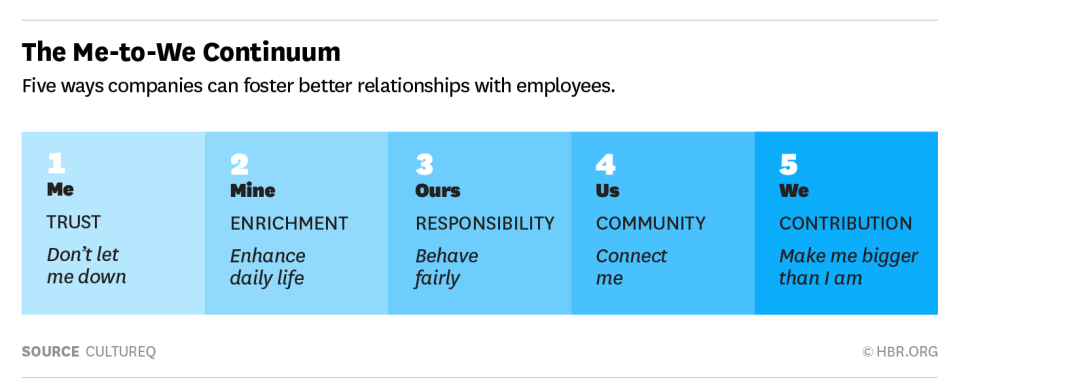我们为什么加入一个集体,或者说需要集体。
在原始的丛林里是因为一个人,打不过狮子。所以我们开始沟通合作。
现在没有狮子里,但是生活还是有一些困难,一些目标是一个人没法解决的。
所以,当我们自愿加入一个集体(不是分配小组讨论,是自愿),初衷和原始丛林时候的祖先是一样的。
讲到公司,当雇员决定加入一个公司,也是要去解决一个人没法解决的问题,所以加入。当然一个公司提供的资源有很多,钱,技术,或者人脉关系,等等。
雇员慢慢获得了公司里面的这些资源,我们说雇员的能力在进步,ta 对于公司创造的价值也会慢慢增加。
这时候公司如果还有其他的资源,ta会留下来。如果没有了,就会选择离开。
这个世界最扛得起时间考验的集体,往往是学校,宗教组织等。
原因就在于,这些集体,这些组织所推崇的那种使命和信念是单个个体时候没法获得的,所以人们需要这些组织,所以ta们历史长久。
换句话说,公司要做长久,很重要的是要找到那一份信念感。
所以从硅谷到北京中关村,到杭州滨江,到深圳南山,公司都开始讲情怀。
只是当我们呼唤更大的追求的时候,要先保障每一个个体的小追求。
HBR 有一篇文章,讲雇员和雇主之间从me 到we 的价值需求。
我们的市场经济在不断的发展和完善,类似的劳资问题、讨论会越来越多。不妨看下这篇文章,做一个理论上的梳理。

原标题:The Intangible Things Employees Want from Employers
原作者:Anne Bahr Thompson
原刊于:Harvard Business Review
There are some companies we look at, admire, and say, “Wow, I really want to work for them.” These companies understand that employees are as important as the paying customers who consume the products and services they sell. And they know that the transparency of social media means the company’s reputation is highly dependent on what its employees say.
It’s never been more important for companies to treat employees well and fairly—but it has also never been more complicated to do so. With so many different generations in the workforce, each expecting different things from their employers, exactly what kind of relationships should companies be fostering with employees—and how should they go about doing so?
My research (quantitative and qualitative studies of Millennials, Gen Xers, and Baby Boomers as part of my company’s Culture Q project) into how cultural sentiments impact people’s relationships with brands has shown that nurturing faithful employee relationships today is no different than cultivating loyal customers. Both begin with a “me-first” orientation—that is, companies must “satisfy my wants and needs first”—and then stretch across a continuum, culminating in a “we” orientation—“address the issues that are important to my community and the broader world” (see the “me-to-we continuum” below). Just as consumers now look to do business with companies that advocate for causes they care about, employees are looking for employers who advocate for them and on their behalf for causes that matter to them. Companies are no longer “just” companies. As technology has removed the boundaries that historically divided our work and personal lives, we are now imbuing employers with the characteristics of friends, family and even enemies—looking for them to focus on the things we care about and, if they don’t, then joining forces with someone else who does.
The acid test of a satisfying employee-employer relationship is rooted in a set of specific behaviors along the “me-to-we continuum.” The best employers help us each achieve our personal “me” goals and dreams on the one hand, while simultaneously collaborating with us to solve more generalized “we” worries about the economy, the environment, the world on the other hand. And, in between the “me” and “we” extremes, there are a variety of ways that employers can enrich the lives of employees and communities alike.

Few companies occupy all five points on the continuum, but the best companies are moving along the spectrum. It’s no longer enough to simply satisfy employees’ own individual needs and wants—companies must also act more broadly, advocating and working on problems in the world that employees care about. Here’s what companies can do, and how their actions along this “me-to-we continuum” can be geared toward what the different generations—Baby Boomers, Gen Xers, and Millennials—are looking for from their employer:
1. Trust—Don’t let me down. Baby Boomers, Gen Xers and Millennials first and foremost want to work for a company they trust, one that lives up to its promises and delivers value to them individually (the “me” proposition). For participants in CultureQ research, fair salary and benefits are the basis of trust in the workplace, and the starting point for any company looking to create a better employer-employee relationship. Policies that ensure people get regular acknowledgement and praise for a job well done are also critical to promoting a more trusting, positive, healthy, relaxed and less-stressed work environment—for all generations.
2. Enrichment—Enhance daily life. Work-life balance (increasingly recognized as simply “life balance” in our 24/7 technology driven environment) rated high across all employee groups, but different cohorts want different things (the “mine” proposition on the continuum above). Baby Boomers look for recognition of their individual strengths and skills, and accountability that fosters pride in a job well done. Gen Xers seek friendly employers that help them to achieve their goals by simplifying their personal chores and making routine tasks easier to accomplish. Millennials yearn for employers that focus on their personal development and well-being: supportive managers, not faceless bosses; rewards for good ideas; egalitarian organizational structures; fully funded professional and personal development programs; and project assignments that vary their work experience.
3. Responsibility—Behave fairly. All people expect their employers to treat others fairly, behave ethically and be proactive in their business practices—toward their employees, suppliers, business partners and other stakeholders (the “our” proposition). This doesn’t mean you have to have a perfect brand reputation. Indeed, Baby Boomers, Gen Xers and Millennials all respect and become fans of businesses that exhibit human traits and are honest about their shortcomings, providing you have not been duplicitous and are making a concerted effort to improve.
4. Community—Connect me. The company we work for is a badge of sorts, signifying who we are and what we’re about to our family, friends and people we meet in general. A sense of “belonging” and working in a culture that mirrors our values has always strengthened employee engagement (the “us” proposition). While Baby Boomers seek to work alongside teammates and Gen Xers look to form friendships with coworkers, Millennials aspire to spend time—physically and virtually—in a cohesive, supportive and enriching environment. They endeavor to connect with friends who share their values and interests, not just career stages, job functions or organizational departments.
5. Contribution—Make me bigger than I am. People want to work for companies that contribute to the communities they care about and help to fix society’s worries, provided that they do not do so with overtly political intentions. They yearn for their employers to advocate on their behalf and focus on the issues that matter most to them. In the absence of trusting government to solve their personal problems and society’s challenges, Baby Boomers, Gen Xers and Millennials all look to the companies they work for in same way they look to the brands they buy—to help them achieve their ideals.
Instead of developing one-off social responsibility initiatives or even cause marketing campaigns for employees, consider how you can support a sense of shared responsibility (the “we” proposition) across the business and thereby engage employees in more meaning.
Treating employees as customers is not a new idea. However, the difference between human resources and human relationships is significant. Supporting employees across the me-to-we continuum encourages more holistic relationships between employees and employers. It enables employees to achieve their full potential based on mutual understanding, mutual respect, mutual reliance and mutual benefit thereby cultivating more loyal connections.
本文源自微信公众号:LABcircle
